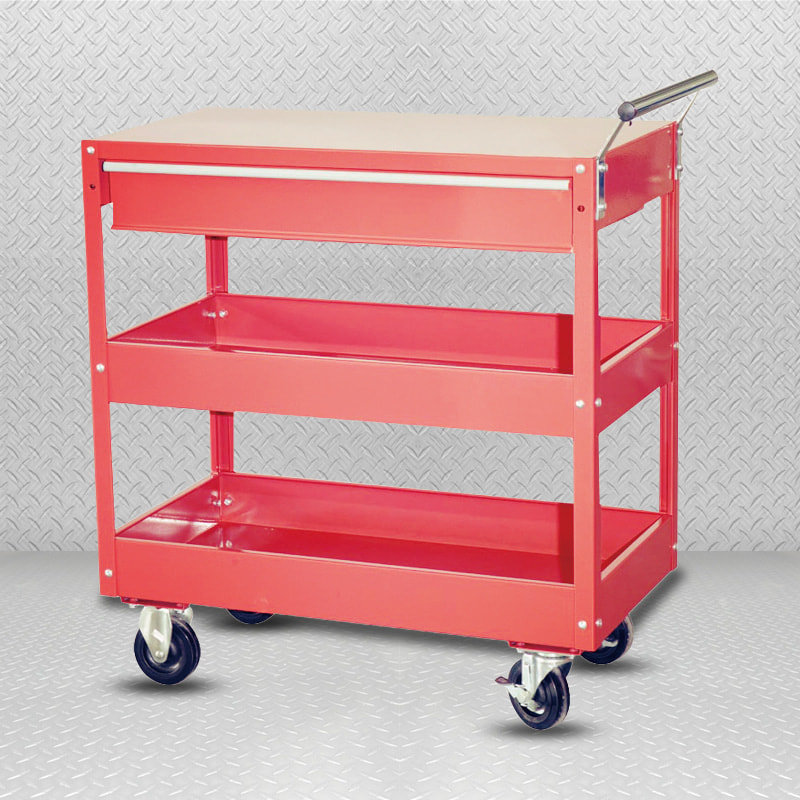Advantages of Multi-Functional Tool Cart
Durability: Metal multi-tool carts, mainly made of steel or aluminum, are known for their sturdy and durable nature. They are built to withstand harsh professional environments, capable of withstanding heavy loads and rough handling without damage or deterioration. This inherent durability ensures an extended service life, reducing the need for frequent replacement of materials that may not be strong enough.
Strength: Inherently strong, metal tool carts offer an unparalleled strength-to-weight ratio. Their resilience to deformation and bending, even under heavy loads, not only ensures the safety of the tools and equipment they carry, but also the structural integrity of the cart itself. This added strength is an essential safety feature, especially in industries where cart stability is critical.
Damage resistance: Metals, whether steel or aluminum, exhibit significant resistance to impact, scratching, or general wear and tear. This feature ensures that the aesthetic and functional aspects of the tool trolley remain intact over time. The surface of a metal tool cart is less likely to succumb to unsightly blemishes or structural flaws, maintaining the cart's professional appearance.
Versatility: Metal tool carts are known for their adaptability. They often come with a range of adjustable features such as shelves, drawers and compartments. These customizable options allow users to effectively organize tools and accessories in a way that suits their specific requirements. This versatility allows for seamless integration of a variety of equipment, further increasing the cart’s utility and value in a variety of professional fields.
Disadvantages of Metal Multi-Tool Carts
Weight: The weight of a metal multi-tool cart, while contributing to its strength and durability, can be a drawback in environments where portability and maneuverability are critical. Their considerable weight creates challenges when they need to be moved or transported frequently, and their ease of use can be hampered in scenarios that require flexibility and rapid repositioning.

Cost: Metal tool carts typically require a higher upfront cost than tool carts made from alternative materials like plastic or wood. This increased expense is primarily attributable to increased manufacturing and raw material expenses related to metal structures. While the initial investment may be higher, think of it as a commitment to long-term durability and performance.
Rust and corrosion: Without proper protection, metal tool carts may rust and corrode, especially in high humidity or humid environments. To alleviate this concern, regular maintenance practices such as cleaning, painting, or applying protective coatings become critical. Ignoring these measures can compromise the aesthetic appeal and structural integrity of your shopping cart.
Conduction of thermoelectricity: Metal is recognized as an effective conductor of thermoelectricity and is also a double-edged sword. This property, while advantageous in some applications, can pose risks in environments involving electrical work or exposure to heat. When using metal tool carts in such environments, special precautions need to be taken to prevent accidental contact with live wires or hot equipment and to ensure the safety of personnel and equipment.

 ENG
ENG  English
English Deutsch
Deutsch











 +86 (0)512-5297 3238
+86 (0)512-5297 3238 +86 (0)512-5297 3239
+86 (0)512-5297 3239 info@chinagoldenline.com
info@chinagoldenline.com  No.58, Yangguang Avenue, Yushan High-tech Industry Zone, Changshu City, Jiangsu, China.
No.58, Yangguang Avenue, Yushan High-tech Industry Zone, Changshu City, Jiangsu, China.

